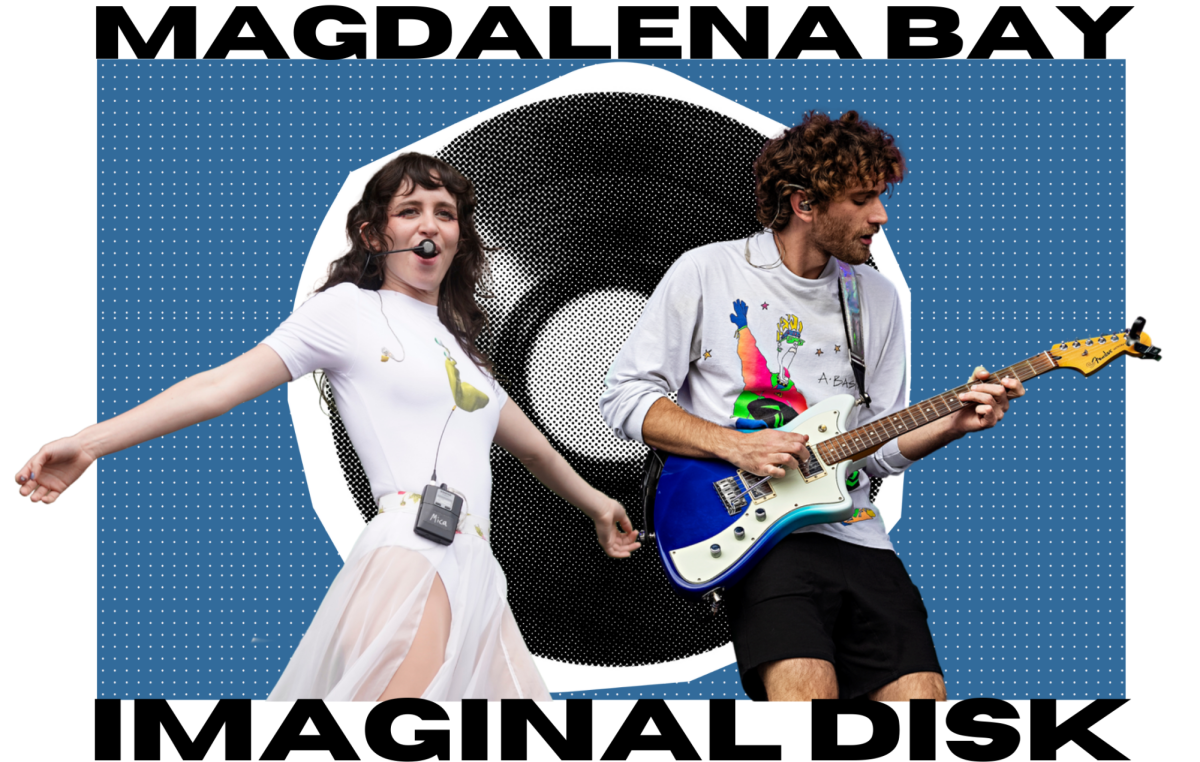Earthquakes don’t happen every day.
Around the planet they do, sure, but not in the average day-to-day life. And they certainly aren’t as seismic as the shake-up the world of pop music just received with Magdalena Bay’s newest album, Imaginal Disk, which debuted Aug. 23.
For years, I’ve lamented the stagnation of pop. From about 2019-2023, radio hits played it too safe, with sonically-conservative releases like Midnights or retro-inspired tracks like “good 4 u” dominating the charts.
The genre didn’t move forward. Nothing progressed. I lost interest.
In 2024, though, the core of the Earth began to shift, and pop music changed again – this time for the better. Chappell Roan took off, and then Charli XCX reasserted her genre influence.
Then, an internet pop duo based in Los Angeles released the best album of the year so far.
Imaginal Disk isn’t just new – it’s ground-breaking. It sounds like what a time traveler would play for you in their time machine stereo right after coming back from 2200, when we’re all living in underwater oases.
Tracks like “Image,” the album’s most-played song on Spotify and one of its most conceptual, set the standard for what pop music can be and should serve as the pallbearer for the Jack Antonoff-esque music that’s anchored the genre for half a decade.
The lyrics tell the story of a woman creating a clone of herself, not burdened by the weighty memories of her past. That escapist theme is central to the album, as the titular “imaginal disk” is what allows for a brain wipe.
The central theme of forgetting the past isn’t just perfect for the sound of the album – it’s perfect for the world we live in, a world where we need to move on from the stress of the early 2020s and start a new day in the sunlit paradise presented by Mica Tenenbaum and Matthew Lewin of Magdalena Bay.
Tenenbaum’s vocal’s aren’t just airy; they’re what I imagine the sun goddess of 2200 sounds like, promising hellfire and peace in the same breath. Her voice lends itself perfectly to optimistic love songs like “Death & Romance,” as her inherently pop-y and weightless singing precisely portrays the adrenaline rush of holding hands and young romance.
“Killing Time,” another of Imaginal Disk’s standout songs, is much more relaxed in its performance but produced as lushly and delicately as any other song on the album. The first few verses are bouncy without losing their calm vibe, and the fuzz bass and distorted guitars of the back half of the song, itself a spiral into the escapist theme, are relieved at once with an angelic coda.
The back half of the record dives further into the album’s concept, and the narrative culminates in Imaginal Disk’s closer, “The Ballad of Matt and Mica.” Here, sonic motifs continue, reprising the album’s opening track, simultaneously sounding like a futuristic hymn and a contemporary pop anthem.
It’s usually a given that an album – even a great one that approaches Disk’s level – will have a few duds, but Disk is non-stop hit after hit after hit. The run spanning from “Image” to “Tunnel Vision” doesn’t have a song that is less than an eight out of 10, and no track on Disk drops below a seven, with “That’s My Floor” being the closest thing to a weak link.
Imaginal Disk isn’t just a great album for the present – it’s a look into what pop music can and should be in five or 10 or 200 years. Art flourishes when artists push the medium forward, bending the rules to create something that recontextualizes all that came before it. With this album, Magdalena Bay has cemented themselves in pop history and redefined the genre.
10/10.


